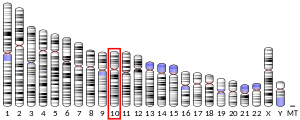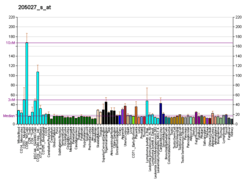MAP3K8
Mitogen-activated protein kinase kinase kinase 8 is an enzyme that in humans is encoded by the MAP3K8 gene.[5][6][7]
Function
This gene was identified by its oncogenic transforming activity in cells. The encoded protein is a member of the serine/threonine protein kinase family. This kinase can activate both the ERK1/2 and p38 MAP kinases.[8][9] This kinase was shown to activate IkappaB kinases, and thus induce the nuclear production of NF-kappaB. This kinase was also found to promote the production of TNF-alpha and IL-2 during T lymphocyte activation. Studies of a similar gene in rat suggested the direct involvement of this kinase in the proteolysis of NF-kappaB1,p105 (NFKB1). This gene may also start transcription at a downstream in-frame translation start codon, and thus produce an isoform containing a shorter N-terminus. The shorter isoform has been shown to display weaker transforming activity.[7] In mice, this gene is known as Tpl2 and it is a tumor suppressor gene whose absence contributes to the development and progression of cancer.[10]
Interactions
MAP3K8 has been shown to interact with AKT1,[11] CHUK,[12] NFKB2,[13] NFKB1,[13][14] C22orf25 [15] and TNIP2.[16]
References
- GRCh38: Ensembl release 89: ENSG00000107968 - Ensembl, May 2017
- GRCm38: Ensembl release 89: ENSMUSG00000024235 - Ensembl, May 2017
- "Human PubMed Reference:". National Center for Biotechnology Information, U.S. National Library of Medicine.
- "Mouse PubMed Reference:". National Center for Biotechnology Information, U.S. National Library of Medicine.
- Miyoshi J, Higashi T, Mukai H, Ohuchi T, Kakunaga T (Aug 1991). "Structure and transforming potential of the human cot oncogene encoding a putative protein kinase". Molecular and Cellular Biology. 11 (8): 4088–96. doi:10.1128/mcb.11.8.4088. PMC 361219. PMID 2072910.
- Chan AM, Chedid M, McGovern ES, Popescu NC, Miki T, Aaronson SA (May 1993). "Expression cDNA cloning of a serine kinase transforming gene". Oncogene. 8 (5): 1329–33. PMID 8479752.
- "Entrez Gene: MAP3K8 mitogen-activated protein kinase kinase kinase 8".
- Arthur JS, Ley SC (Sep 2013). "Mitogen-activated protein kinases in innate immunity". Nature Reviews Immunology. 13 (9): 679–92. doi:10.1038/nri3495. PMID 23954936.
- Pattison MJ, Mitchell O, Flynn HR, Chen CS, Yang HT, Ben-Addi H, Boeing S, Snijders AP, Ley SC (Sep 2016). "TLR and TNF-R1 activation of the MKK3/MKK6-p38α axis in macrophages is mediated by TPL-2 kinase". Biochemical Journal. 473 (18): 2845–61. doi:10.1042/BCJ20160502. PMC 5095906. PMID 27402796.
- DeCicco-Skinner, Kathleen (2011). "Loss of tumor progression locus 2 (tpl2) enhances tumorigenesis and inflammation in two-stage skin carcinogenesis". Oncogene. 30 (4): 389–97. doi:10.1038/onc.2010.447. PMC 3460638. PMID 20935675.
- Kane LP, Mollenauer MN, Xu Z, Turck CW, Weiss A (Aug 2002). "Akt-dependent phosphorylation specifically regulates Cot induction of NF-kappa B-dependent transcription". Molecular and Cellular Biology. 22 (16): 5962–74. doi:10.1128/MCB.22.16.5962-5974.2002. PMC 133991. PMID 12138205.
- Lin X, Cunningham ET, Mu Y, Geleziunas R, Greene WC (Feb 1999). "The proto-oncogene Cot kinase participates in CD3/CD28 induction of NF-kappaB acting through the NF-kappaB-inducing kinase and IkappaB kinases". Immunity. 10 (2): 271–80. doi:10.1016/S1074-7613(00)80027-8. PMID 10072079.
- Bouwmeester T, Bauch A, Ruffner H, Angrand PO, Bergamini G, Croughton K, Cruciat C, Eberhard D, Gagneur J, Ghidelli S, Hopf C, Huhse B, Mangano R, Michon AM, Schirle M, Schlegl J, Schwab M, Stein MA, Bauer A, Casari G, Drewes G, Gavin AC, Jackson DB, Joberty G, Neubauer G, Rick J, Kuster B, Superti-Furga G (Feb 2004). "A physical and functional map of the human TNF-alpha/NF-kappa B signal transduction pathway". Nature Cell Biology. 6 (2): 97–105. doi:10.1038/ncb1086. PMID 14743216.
- Belich MP, Salmerón A, Johnston LH, Ley SC (Jan 1999). "TPL-2 kinase regulates the proteolysis of the NF-kappaB-inhibitory protein NF-kappaB1 p105". Nature. 397 (6717): 363–8. doi:10.1038/16946. PMID 9950430.
- "Molecular Interaction Database". Archived from the original on 2006-05-06. Retrieved 2012-05-08.
- Lang V, Symons A, Watton SJ, Janzen J, Soneji Y, Beinke S, Howell S, Ley SC (Jun 2004). "ABIN-2 forms a ternary complex with TPL-2 and NF-kappa B1 p105 and is essential for TPL-2 protein stability". Molecular and Cellular Biology. 24 (12): 5235–48. doi:10.1128/MCB.24.12.5235-5248.2004. PMC 419892. PMID 15169888.
Further reading
- Aoki M, Akiyama T, Miyoshi J, Toyoshima K (Sep 1991). "Identification and characterization of protein products of the cot oncogene with serine kinase activity". Oncogene. 6 (9): 1515–9. PMID 1833717.
- Aoki M, Hamada F, Sugimoto T, Sumida S, Akiyama T, Toyoshima K (Oct 1993). "The human cot proto-oncogene encodes two protein serine/threonine kinases with different transforming activities by alternative initiation of translation". The Journal of Biological Chemistry. 268 (30): 22723–32. PMID 8226782.
- Salmeron A, Ahmad TB, Carlile GW, Pappin D, Narsimhan RP, Ley SC (Feb 1996). "Activation of MEK-1 and SEK-1 by Tpl-2 proto-oncoprotein, a novel MAP kinase kinase kinase". The EMBO Journal. 15 (4): 817–26. doi:10.1002/j.1460-2075.1996.tb00417.x. PMC 450280. PMID 8631303.
- Ballester A, Tobeña R, Lisbona C, Calvo V, Alemany S (Aug 1997). "Cot kinase regulation of IL-2 production in Jurkat T cells". Journal of Immunology. 159 (4): 1613–8. PMID 9257820.
- Ballester A, Velasco A, Tobeña R, Alemany S (Jun 1998). "Cot kinase activates tumor necrosis factor-alpha gene expression in a cyclosporin A-resistant manner". The Journal of Biological Chemistry. 273 (23): 14099–106. doi:10.1074/jbc.273.23.14099. PMID 9603908.
- Lin X, Mu Y, Cunningham ET, Marcu KB, Geleziunas R, Greene WC (Oct 1998). "Molecular determinants of NF-kappaB-inducing kinase action". Molecular and Cellular Biology. 18 (10): 5899–907. doi:10.1128/mcb.18.10.5899. PMC 109176. PMID 9742107.
- Belich MP, Salmerón A, Johnston LH, Ley SC (Jan 1999). "TPL-2 kinase regulates the proteolysis of the NF-kappaB-inhibitory protein NF-kappaB1 p105". Nature. 397 (6717): 363–8. doi:10.1038/16946. PMID 9950430.
- Lin X, Cunningham ET, Mu Y, Geleziunas R, Greene WC (Feb 1999). "The proto-oncogene Cot kinase participates in CD3/CD28 induction of NF-kappaB acting through the NF-kappaB-inducing kinase and IkappaB kinases". Immunity. 10 (2): 271–80. doi:10.1016/S1074-7613(00)80027-8. PMID 10072079.
- Chiariello M, Marinissen MJ, Gutkind JS (Mar 2000). "Multiple mitogen-activated protein kinase signaling pathways connect the cot oncoprotein to the c-jun promoter and to cellular transformation". Molecular and Cellular Biology. 20 (5): 1747–58. doi:10.1128/MCB.20.5.1747-1758.2000. PMC 85357. PMID 10669751.
- Sánchez-Góngora E, Lisbona C, de Gregorio R, Ballester A, Calvo V, Pérez-Jurado L, Alemany S (Oct 2000). "COT kinase proto-oncogene expression in T cells: implication of the JNK/SAPK signal transduction pathway in COT promoter activation". The Journal of Biological Chemistry. 275 (40): 31379–86. doi:10.1074/jbc.M000382200. PMID 10896655.
- Luftig MA, Cahir-McFarland E, Mosialos G, Kieff E (May 2001). "Effects of the NIK aly mutation on NF-kappaB activation by the Epstein-Barr virus latent infection membrane protein, lymphotoxin beta receptor, and CD40". The Journal of Biological Chemistry. 276 (18): 14602–6. doi:10.1074/jbc.C100103200. PMID 11278268.
- Eliopoulos AG, Davies C, Blake SS, Murray P, Najafipour S, Tsichlis PN, Young LS (May 2002). "The oncogenic protein kinase Tpl-2/Cot contributes to Epstein-Barr virus-encoded latent infection membrane protein 1-induced NF-kappaB signaling downstream of TRAF2". Journal of Virology. 76 (9): 4567–79. doi:10.1128/JVI.76.9.4567-4579.2002. PMC 155061. PMID 11932422.
- Kane LP, Mollenauer MN, Xu Z, Turck CW, Weiss A (Aug 2002). "Akt-dependent phosphorylation specifically regulates Cot induction of NF-kappa B-dependent transcription". Molecular and Cellular Biology. 22 (16): 5962–74. doi:10.1128/MCB.22.16.5962-5974.2002. PMC 133991. PMID 12138205.
- Waterfield MR, Zhang M, Norman LP, Sun SC (Mar 2003). "NF-kappaB1/p105 regulates lipopolysaccharide-stimulated MAP kinase signaling by governing the stability and function of the Tpl2 kinase". Molecular Cell. 11 (3): 685–94. doi:10.1016/S1097-2765(03)00070-4. PMID 12667451.
- Channavajhala PL, Wu L, Cuozzo JW, Hall JP, Liu W, Lin LL, Zhang Y (Nov 2003). "Identification of a novel human kinase supporter of Ras (hKSR-2) that functions as a negative regulator of Cot (Tpl2) signaling". The Journal of Biological Chemistry. 278 (47): 47089–97. doi:10.1074/jbc.M306002200. PMID 12975377.
- Gándara ML, López P, Hernando R, Castaño JG, Alemany S (Oct 2003). "The COOH-terminal domain of wild-type Cot regulates its stability and kinase specific activity". Molecular and Cellular Biology. 23 (20): 7377–90. doi:10.1128/MCB.23.20.7377-7390.2003. PMC 230324. PMID 14517305.
- Bouwmeester T, Bauch A, Ruffner H, Angrand PO, Bergamini G, Croughton K, Cruciat C, Eberhard D, Gagneur J, Ghidelli S, Hopf C, Huhse B, Mangano R, Michon AM, Schirle M, Schlegl J, Schwab M, Stein MA, Bauer A, Casari G, Drewes G, Gavin AC, Jackson DB, Joberty G, Neubauer G, Rick J, Kuster B, Superti-Furga G (Feb 2004). "A physical and functional map of the human TNF-alpha/NF-kappa B signal transduction pathway". Nature Cell Biology. 6 (2): 97–105. doi:10.1038/ncb1086. PMID 14743216.




